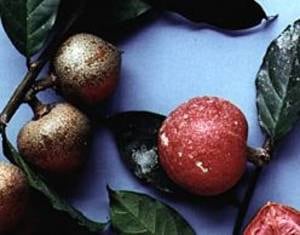Brazzein is the name of the sweet-tasting protein that occurs naturally in the West African fruit of the climbing plant, Pentadiplandra brazzeana Baillon, also known as oubli.
The zero-calorie protein is around 1,500 times sweeter than sugar and has a similar flavour profile to sucrose with no after-taste. However, the oubli fruit

is rare and protected by biodiversity laws so extracting it from the fruit is not possible, and scale up has proven difficult.
UK company Magellan Life Sciences has developed a fermentation process that promises commercial quantities of the protein that are ‘nature identical’. Using an FDA-approved microorganism strain and food-grade chemicals to provide carbon and nitrogen sources for the fermentation process.
Although the microorganism is genetically modified (GM), the brazzein does not contain this and the final product could therefore be labelled as GM-free, it said.
“The platform’s industry leading productivity level combined with simplified down-stream processing makes it the first commercially viable and scalable production process for brazzein,” the company said.
A patent has already been approved by the Indian patent office and is pending in the US, EU and China.
'Significant advantage'
Magellan Life Sciences was founded by husband-and-wife team Dr Abhiram Dukkipati, a biologist and former Stanford University fellow, who is the company’s CEO and Laxmi Wagle, the chief strategy officer.
Dukkipati said: “The end consumer is seeking a sweetener that actually tastes like sugar without any of the off-tastes of stevia. Brazzein is closer in taste to sugar than steviol glycosides. The sheer taste factor puts brazzein at a significant advantage over stevia and most other artificial sweeteners.”
Water-soluble brazzein also withstands typical cooking processes such as high temperatures and freezing and has a range of pH values, making it interesting for food manufacturers.
Scaling-up
So if brazzein really is the holy grail of sugar replacement and has a clean, sucrose-like taste, why has it not already been embraced by the food industry?
“This is often the question that people ask,” Wagle admits. “From the time the molecule was discovered, the University of Wisconsin had a patent on it, and when this expired, a few companies tried to produce it.
“You can make the molecule in a laboratory but if you want to do it on a commercial scale, you need to be able to produce it in tonnes. That scaling-up process is something people haven’t been able to do. Now we have a process to do that.”
In 2016, Korean researchers described a method of scaling up brazzein using the kluyveromyces lactis yeast strain while US-based Natur Research Ingredients has been working to bring it to market since around 2008.
UK move
The company was established in 2014 in Hyderabad in the couple’s native India but FoodNavigator spoke to Wagle on the day it became a UK limited company – a strategic move that will see its headquarters move to London and a research laboratory and pilot plant to Norwich.
“Science in India is still in nascent stage and it can be difficult to get funding or attract foreign investment there,” said Wagle. “People in the West are also more accepting of new molecules on the market, so this is another reason why we wanted to move.”
Interest has been growing. In January this year, it was selected for the Rebel Bio accelerator program and in 2017, won Danish biotech supplier Novozymes’ Scicube open innovation challenge.
It has also received funding from life sciences investment firm, SOSV.
Next steps
The next steps are scaling up production in the UK site and preparing the paperwork and necessary studies to get the product approved for the market. The company will be applying to the US Food and Drug Administration for Generally Recognised as Safe (GRAS) status and submitting a request for a scientific opinion to the European Food Safety Authority (EFSA).
Based on conservative estimates from regulatory consultants, Wagle said they expect to be approved in around one and a half years.
It is not yet clear how the sweetener could be labelled on pack but Dukkipati is confident that “since brazzein actually occurs in nature, we would most likely label it as a ‘natural’ sweetener”.
While it is too early to have an idea of its cost, Wagle said she expects it to be “as competitive as premium quality stevia” which retails for around $300 per kilo, “if not more so”.
“Another advantage is that 1 kg of stevia is equivalent to 250 g of brazzein so the cost-in-use could be lower.”
Magellan Life Sciences is currently conducting trials with food companies to explore its functionality, such as bulking properties.
